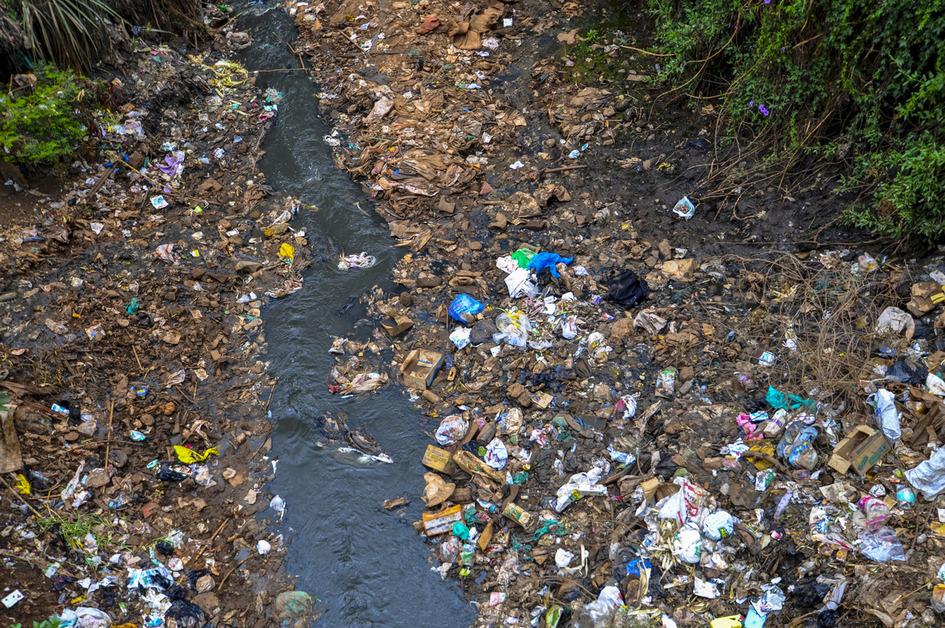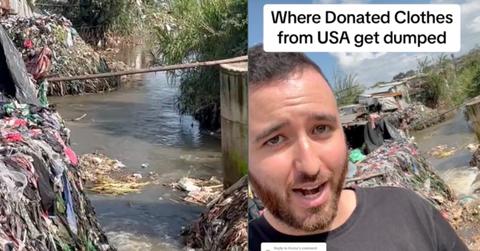The Clothes You Donated Could Be Sitting in the Nairobi River
Published Jan. 2 2024, 4:57 p.m. ET
The clothing you donate may not end up where you think — unless you happen to be thinking of the Nairobi River.
One TikToker uncovered the realities of clothing donations that get sent to Africa, and documented how items are either resold or dumped into the environment; for instance, into the Nairobi River in Kenya.
Much of the clothing donated around the world each year is often not being given to people in need for free, but actually resold or dumped, leaching plastics into the environment in the process. Let’s explore how this happens, and how you can avoid your future donations being dumped.

A content creator is showing the realities of what happens to donated clothes sent to Africa.
Content creator Rory Gallagher, @roaringtravel on TikTok, is exposing how many donated clothes from the U.S. and other countries become waste in Kenya. According to his videos, many people may think they are donating clothes to be given to people in Africa for free. In reality, they are being collected by for-profit companies, and being resold.
Not only that, but a lot of the clothing donated is damaged or unsellable, and becomes waste. According to one of Gallagher’s videos, about half of what comes in each clothing bundle is thrown out. However, this doesn’t mean they are taken to some trash dump or waste site — a lot of the time, clothing is thrown straight into the Nairobi River.
In a paper written in 2021 by the Changing Markets Foundation, research revealed that most clothing donated to other countries ends up as an environmental burden, and significantly increases plastic pollution. It was estimated that more than 900 million items of clothing were donated to Kenya in 2021, 458 million of those items became waste, and 307 million of those waste items contained synthetic fibers.
In Kenya, the Swahili word for waste clothing is “fagia,” and it is dumped in the Nairobi River or burned for fuel to cook food. Most of the dumped clothing is of poor quality and contains plastic, meaning the materials being burned could pose a serious health hazard, especially if they are being used for food. The Nairobi riverbank, where much of the clothing is dumped when unusable, has become spongy, and the river flow is clogged and contaminated with clothing waste, per Down To Earth.
Where should you donate clothes so that they don’t become waste?
The first thing to ask yourself before donating an item of clothing is if it actually can be worn again. If the answer is no, the higher the likelihood that it could be going straight to a landfill. In this case, consider repurposing the items into something useful, like a cleaning rag.
Another option would be to donate old clothing and linens to an animal shelter, where many old clothing items and rags can be used for bedding and cleaning. If neither of these is possible, there are some recycling programs that take specific types of garments — check out our guides to recycling bras, recycling underwear, recycling fur coats, and recycling linens.
You can also opt for general textile recycling, where companies recycle unwearable garments into things like carpet pads.
If your clothing can be worn again, finding local reputable charities to donate to is a good option. When donating to small vet charities and religious organizations, there is a better chance of your clothing going to someone actually in need. You can check the reputability of charities on websites like Charity Navigator, Give.org, and Charity Watch, per The Washington Post.
